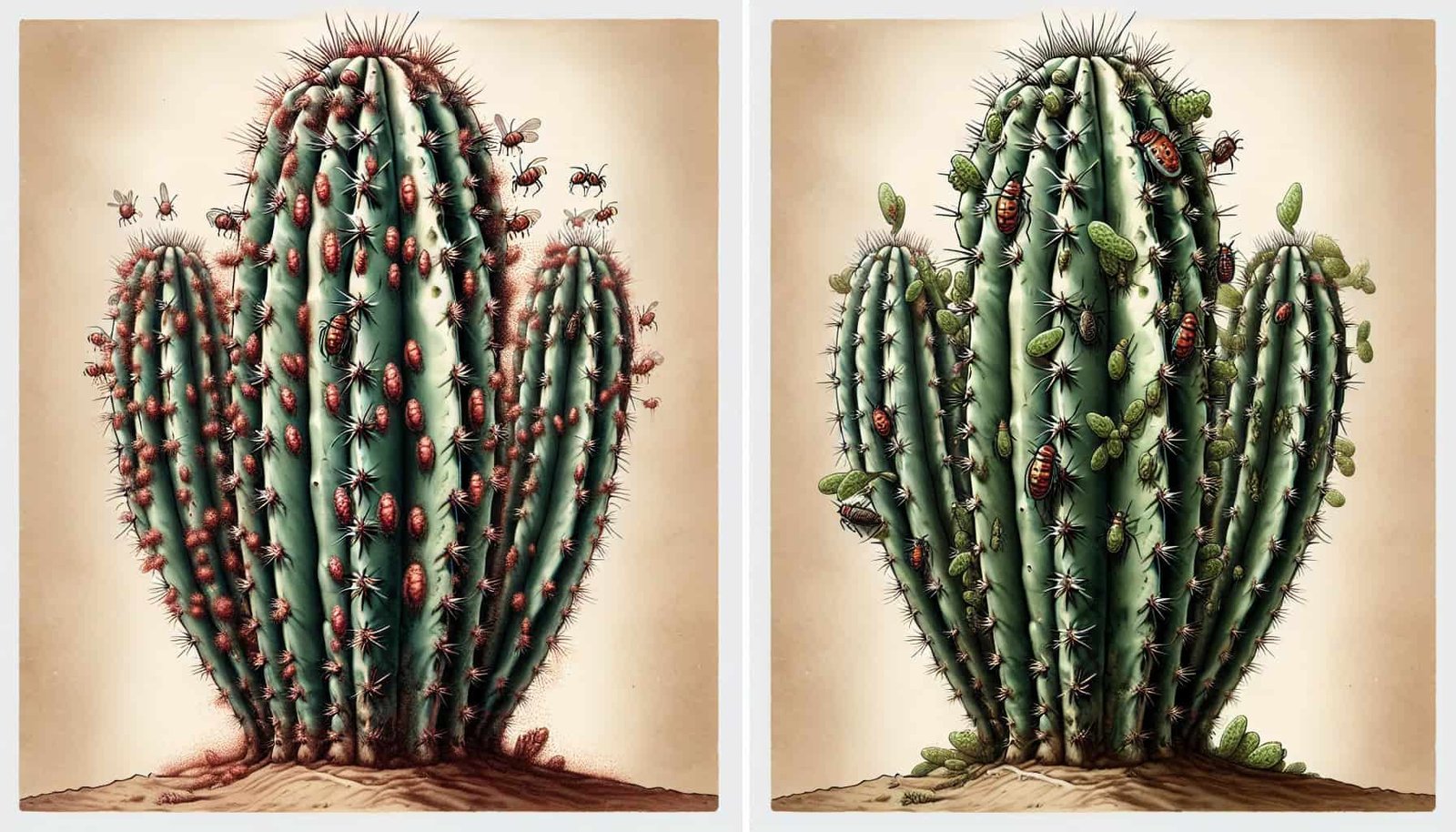Have you ever wondered if neem oil can be used to manage pests on nopal plants? Nopal, a type of cactus commonly known for its prickly pads, is susceptible to various pests that can harm its health and productivity. In this article, we will explore the potential benefits of using neem oil as a natural solution for pest control on nopal. By understanding how neem oil works and its effects on pests, you can make an informed decision on whether to incorporate it into your pest management practices for nopal plants.
What is neem oil?
Neem oil is a natural and organic substance derived from the neem tree, scientifically known as Azadirachta indica. It has been widely used in traditional medicine and pest management practices for centuries. Neem oil is extracted from the seeds of the neem tree and is known for its potent insecticidal properties. It contains numerous active compounds, including azadirachtin, which is the main insecticidal component. Neem oil is commonly used for pest management on various plants, including nopal, due to its effectiveness and safety.
Pest management on nopal
Nopal, also known as prickly pear cactus, is a popular plant grown in many parts of the world. However, like any other plant, it is vulnerable to various pests that can severely damage its growth and productivity. Therefore, effective pest management techniques are essential to protect nopal from pest infestations and ensure its optimal health.
Common pests affecting nopal
Nopal can be targeted by several common pests, including cochineal insects, mealybugs, aphids, scale insects, and spider mites. These pests feed on the plant sap, causing stunted growth, discoloration, and deformation of the plant. If left uncontrolled, these pests can significantly reduce nopal’s productivity and even lead to plant death.
Traditional methods of pest management on nopal
Before the introduction of modern pest management techniques, traditional methods were used to control pests on nopal. These methods often involved physical removal of pests by handpicking or using natural predators such as ladybugs and lacewings. While these methods can be effective to some extent, they may not provide adequate control against severe pest infestations.
Introduction to neem oil as a pest management solution on nopal
Neem oil has emerged as a promising pest management solution for nopal. Its effectiveness against a wide range of pests, organic nature, and minimal impact on the environment and beneficial insects make it a preferred choice for many growers. Neem oil works by disrupting the feeding and reproductive cycles of pests, ultimately leading to their demise. Its ability to control both adult pests and their eggs makes it an invaluable tool in pest management on nopal.

Benefits of using neem oil for pest management on nopal
Organic and environmentally friendly
One of the major advantages of neem oil is its organic nature. It is derived from natural sources and does not contain harmful synthetic chemicals. This makes it an environmentally friendly option for pest management on nopal. Neem oil breaks down rapidly in the environment, reducing the risk of persisting residues.
Effective against a wide range of pests
Neem oil has a broad spectrum of activity against various pests that commonly infest nopal. It can effectively control cochineal insects, mealybugs, aphids, scale insects, and spider mites. This versatility makes neem oil an ideal choice for growers dealing with multiple pest problems.
Residual effects
Neem oil provides residual effects, which means it continues to protect the plant against pests even after application. This can be particularly useful in preventing re-infestations and maintaining long-term pest control on nopal.
Non-toxic to humans and pets
Unlike many chemical pesticides, neem oil is considered safe for humans and pets when used as directed. It does not pose a significant health risk and can be a suitable option for households with children and pets. However, it is still important to follow proper safety precautions during neem oil application.
How does neem oil work on pests?
Mode of action
Neem oil’s mode of action involves disrupting the hormonal systems of pests, leading to their inability to molt, feed, and reproduce. The active compound, azadirachtin, interferes with the pest’s growth and development, ultimately causing their demise. Neem oil also affects the hormonal balance of pests, reducing their ability to reproduce and infest the plant.
Repellent properties
Neem oil possesses repellent properties that can deter pests from infesting nopal. The strong scent and taste of neem oil act as a natural deterrent, keeping pests at bay and reducing the likelihood of an infestation.
Disruption of pest life cycle
Neem oil disrupts the life cycle of pests, targeting both the adult pests and their eggs. It inhibits the reproduction and maturation of pests, preventing them from reaching their full potential and causing damage to the nopal plant.
Antifeedant effects
Neem oil also acts as an antifeedant, making the plant unpalatable to pests. This discourages pests from feeding on the plant and reduces their ability to cause damage. By deterring pests from feeding, neem oil further limits their reproductive capacity and decreases their overall impact on nopal.

Application of neem oil on nopal
Choosing the right neem oil product
When selecting a neem oil product for pest management on nopal, it is important to choose a high-quality, cold-pressed neem oil. Cold-pressed oils retain more of the beneficial compounds, ensuring maximum effectiveness.
Mixing and dilution instructions
Neem oil should be mixed with water and a suitable emulsifier before application. Follow the manufacturer’s instructions for proper mixing and dilution ratios. It is crucial to ensure the neem oil is thoroughly mixed to achieve an even distribution of the active compounds.
Timing and frequency of application
The timing and frequency of neem oil applications depend on the severity of the pest infestation and the specific requirements of the nopal plant. Generally, it is recommended to apply neem oil at early stages of pest infestation or as a preventive measure. Repeat applications may be necessary at regular intervals for continuous pest control.
Proper application techniques
Neem oil should be applied to the entire plant, including the upper and lower leaf surfaces, stems, and branches. Use a sprayer or a brush to ensure thorough coverage. It is essential to follow the manufacturer’s instructions regarding application rates and precautions to achieve optimal results.
Precautions and considerations
Possible phytotoxicity
While neem oil is generally safe for plants, some nopal varieties may be sensitive to its application. Before using neem oil on a large scale, it is advisable to conduct a small-scale patch test to determine if any phytotoxicity occurs. This will help ensure the compatibility of neem oil with your particular nopal plants.
Impact on beneficial insects
While neem oil is considered safe for beneficial insects like bees and ladybugs, it is advisable to apply neem oil in the early morning or late evening when these insects are less active. This minimizes any potential negative impacts on their populations.
Compatibility with other pest management methods
Neem oil can be used in combination with other pest management strategies, such as cultural practices, biological control agents, and insecticides. However, it is important to carefully assess the compatibility and potential interactions between neem oil and other products to avoid any detrimental effects.
Proper storage and handling
Neem oil should be stored in a cool, dark place away from direct sunlight and extreme temperatures. Always follow the manufacturer’s instructions for proper storage and handling to maintain the effectiveness of the product.

Research and studies on neem oil for pest management on nopal
Numerous research studies have evaluated the efficacy of neem oil for pest management on nopal. These studies have consistently demonstrated the effectiveness of neem oil in controlling various pests, including cochineal insects, mealybugs, aphids, scale insects, and spider mites. The results have shown reductions in pest populations and improved plant health when neem oil was used as part of an integrated pest management approach.
Tips for successful pest management with neem oil
Regular monitoring of pest populations
Regularly monitor the nopal plants for signs of pest infestations. Early detection allows for prompt neem oil application at the first signs of a problem, preventing pest populations from escalating.
Rotation with other pest management strategies
To prevent the development of pest resistance, it is advisable to rotate neem oil with other pest management strategies. This can include cultural practices, such as maintaining proper plant hygiene and removing infested plant material, as well as the use of biological control agents or selective insecticides.
Appropriate timing of applications
Timing is crucial when applying neem oil for pest management on nopal. Consider the pest life cycles and apply neem oil at the most vulnerable stages, such as when pests are actively feeding or reproducing. This ensures maximum effectiveness and minimizes pest damage.
Follow manufacturer’s instructions
Always read and follow the manufacturer’s instructions on the neem oil product label. Adhering to the recommended application rates, mixing instructions, and safety precautions will help ensure successful pest management and avoid any adverse effects.

Conclusion
Neem oil offers a natural, effective, and environmentally friendly pest management solution for nopal. Its wide range of benefits, including its organic nature, effectiveness against various pests, residual effects, and non-toxicity to humans and pets, make it an ideal choice for growers. By understanding how neem oil works on pests, following proper application techniques, and considering necessary precautions, you can successfully manage pest infestations on nopal while promoting plant health and productivity. Don’t let pests diminish the beauty and vitality of your nopal plants – harness the power of neem oil for effective pest management.

